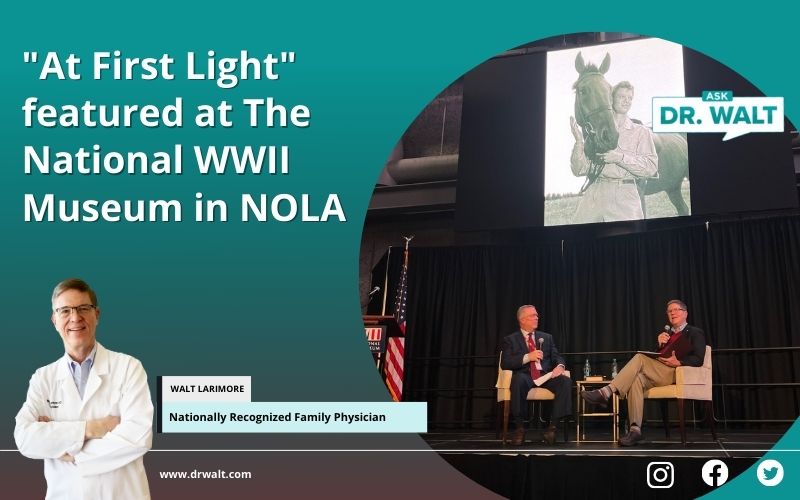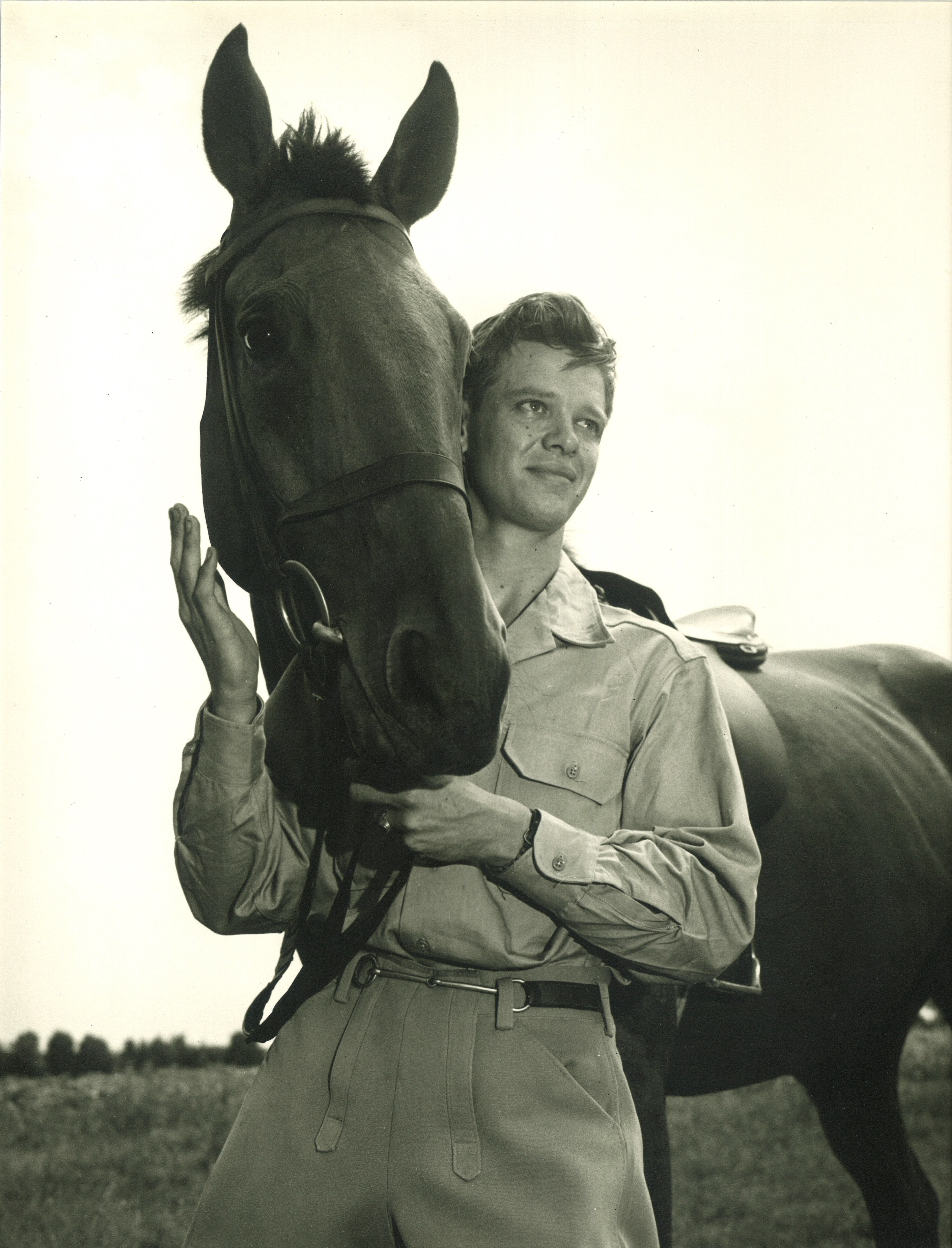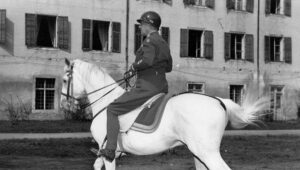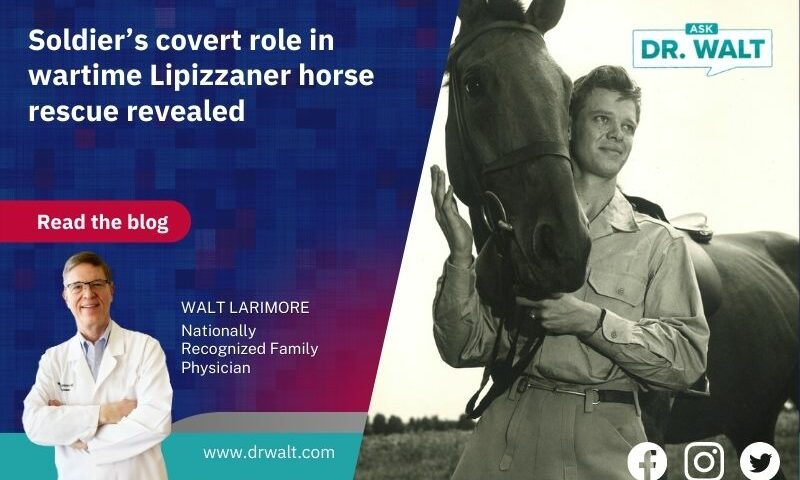
“At First Light” featured at The National WWII Museum in NOLA
January 26, 2023
My WWII book “At First Light” becomes an Amazon.com #1 Best Seller
January 31, 2023Here’s a January 22, 2023 excerpt from my and Mike Yorkey’s award-winning WWII book, At First Light: A True World War II Story of a Hero, His Bravery, and an Amazing Horse that was published on0 the Horse Talk website out of New Zeland that I thought you might enjoy.

General George Patton, who had competed in the 1912 Olympic Games, pictured riding the stallion Lipizzaner stallion Favory. Patton put the Spanish Riding School under the special protection of the US Army. The second part of the operation, “Operation Cowboy”, was the recovery of 1200 horses, including 375 Lippizaners, from Hostau in Czechoslovakia. (Image via Wikimedia Commons)
Philip B. Larimore, Jr., earned three Purple Hearts (he refused three others), two Bronze Stars, two Silver Stars, and the Distinguished Service Cross for his service with the US Army in World War 2, but even his family did not know the extent of his wartime exploits.
His real-life adventures as one of the youngest and most decorated front-line officers in WW2 have been revealed in the new book At First Light, after painstaking research by Phil’s son Walt Larimore.
Those exploits include a part in the secret mission that Phil Larimore called “Operation Lipizzaner”, outlined in the recent article A hero, his horse, and the secret story of the Lipizzan rescue.
This excerpt is the first of the three chapters from At First Light, which tell the story of Phil Larimore’s role in “Operation Cowboy”.
Enjoy!
Soldier’s covert role in wartime Lipizzaner horse rescue revealed
Excerpt courtesy of Knox Press, an Imprint of Post Hill Press, © 2022 Walter L. Larimore. All Rights Reserved.
Chapter 40: A Secret Mission
On Monday, April 2, 1945, just before dinner, Phil was outside his company CP smoking a cigarette with his executive officer, Lieutenant Abraham Fitterman. Suddenly, a Jeep raced up and skidded to a halt. In the passenger seat was a man Phil didn’t recognize, wearing a major’s insignia on his impeccably clean and pressed uniform.
Phil and Abe looked suspiciously at each other as they popped to attention and saluted. The officer hopped out of the Jeep, stood, saluted back, and barked, “At ease. I’m Major Hugh A. Scott, Division G-21. I’m looking for Lieutenant Larimore.”
“That would be me, sir,” Phil replied.
Major Scott shook Phil’s hand and gestured to step away from the Jeep for a private conversation. After hearing what the major had to say, Phil hopped in the back seat of the Jeep with Major Scott and raced away, ending up at the Battalion CP, which had taken up residence in a nicely appointed German villa.
Phil followed the rapidly walking major into the manor and up the stairs to the command room, where Colonel McGarr was on the telephone. After finishing his conversation, he dismissed all men except for Major Scott and his two valets.
“I’m going to have dinner brought up for us if that’s okay,” McGarr said. It was not a request, and the two young officers nodded. As the valets set the table, McGarr handed Phil a cigar and poured tumblers of scotch all around. As they lit up, he asked, “Any idea why you’re here, Lieutenant?”

Cemetery. Image from At First Light.
Phil glanced dubiously at the major, who sat stone-faced, and then back at the colonel. “No, sir.”
McGarr took a sip of his scotch and leaned back. “Damnedest thing. Cobra tells me he has it on good authority that there are rumors of a bunch of highbrow horses just across the border in Czechoslovakia that need to be saved. But we need confirmation, which means we need an equestrian to find out if it’s true.”
Phil glanced dubiously at the major, who sat stone-faced, and then back at the colonel. “No, sir.”
McGarr took a sip of his scotch and leaned back. “Damnedest thing. Cobra tells me he has it on good authority that there are rumors of a bunch of highbrow horses just across the border in Czechoslovakia that need to be saved. But we need confirmation, which means we need an equestrian to find out if it’s true.”
“Cobra?” Phil asked.
“O’Daniel’s code name.”
“And the general wants me to go there?”
“Cobra has sent his G-2 to explain this to us.” He nodded at Major Scott, but three men entered before he could start, each carrying a tray of food. The officers sat at the table and were served dinner.
As they enjoyed their hot meal, Major Scott began his story. “There’s an Army intelligence unit working near the German-Czech border, about ninety miles east of Nuremberg, interrogating German POWs. They learned about a large stud farm, formerly owned by the Czech royal family but confiscated by the Nazis, near a tiny Bohemian village called Hostau, about ten miles east of the German border as the crow flies. Intelligence says Hitler and his underlings have gathered what may be the finest collection of mounts in the world. Apparently, it’s some experiment to purify the breeds the same way he wants to purify the races.”
Phil’s interest peaked. “Which breeds?”
The major pulled a small notebook out of his chest pocket. “Says here they have Arabians, Andalusians, Friesians, Anglo-Kabardas — don’t exactly know what those are.”
“Those are all considered royal breeds, horses preferred by and bred for kings and queens,” Phil explained. “They’ve all been used as warhorses throughout history across Europe. Amazing creatures.”
The major looked back at his notes. “He also spoke about the farm having Thoroughbreds stolen from the capitals of Europe, including several famous racehorses that won Europe’s top sweepstakes.”
“Must be quite a farm,” Phil said.
“It’s even better than you think, Lieutenant. They’ve also gathered Lipizzaners.”
“The dancing white horses of Austria!” Phil exclaimed. “I saw them perform when I was a kid, and I’ve seen pictures of them at the Spanish Riding School in Vienna. The best classical dressage mounts in the world. Ever seen that famous painting of Napoleon crossing the Alps? That one shows him leading his troops from the back of a prancing Lipizzaner stallion.” 2
The major nodded, looked down at his notebook and continued. “Intelligence reports that as far back as 1939, Hitler ordered his men to capture every Lipizzaner they could find. Adolf Hitler coveted the Lipizzaner for its white coat and its perceived racial purity. The super race he planned needed splendid stallions beneath them. They’ve netted about 250 of the horses, which may represent most of the suitable breeding stock in the world.”
Phil softly whistled. “What do you need me to do?”
The major smiled again. “I like a man who gets to the point. Intelligence tells us that over the last month or so, more and more horses — some Lipizzaners, some not — have been pouring into the Hostau stable from the eastern part of Czechoslovakia, which the Red Army is overrunning. Things appear to be getting desperate. One report says, and I quote, ‘In the path of the Russian armies, nothing is safe. Men and boys are killed, and women and girls are raped and murdered. Animals that can be eaten are sent back to the starving Soviet Union, where famine continues,’ end quote.”
Phil sat straight up. “You don’t think the Russians would harm the Lipizzaners, do you?”
The major flipped a few pages of his notebook and found what he was looking for. “We have this report from just a week ago, twenty-four March. Quote, ‘A German convoy was intercepted by Soviet tanks an hour from the Austrian border. Inside the trucks were more than twenty Lipizzaners. The Russian soldiers found the sometimes-temperamental steeds too difficult to control, so they slaughtered eighteen of the most high-spirited ones, then harnessed the others to ammunition carts,’ end quote.” The G-2 closed his notebook and put it back into his pocket.
“General O’Daniel tells me, Lieutenant Larimore, that you know of his love of horses. He’s been riding horses his whole life. Loved the cavalry, loves the hunt, and loves the steeplechase. He’s not an Olympian like Patton, but he wants to do something. He’s suggesting one of our Piper Cubs carry a soldier, an expert equestrian, behind enemy lines to either confirm or refute this information. If confirmed, the general will propose to senior command that these steeds be saved. Unfortunately, his superiors will not officially sanction such a mission. Fortunately for us, they are not forbidding it either. But should the
mission fail, the Army’s official comment would be that any participants were just plain lost in western Czechoslovakia — or worse, that they were AWOL or attempting to defect.”
The gravity of the situation fully rested on Phil’s shoulders. He leaned back and sighed deeply.
“Let me be clear, Lieutenant,” the major continued, “if you volunteer for this mission, the plane that’ll transport you will have all the markings painted out, and you will not be in uniform. You can carry a sidearm and keep your dog tags with you, but you can bring no other identification. No papers. No wallet. Being an unauthorized mission, if you are captured, any future career in the Army would likely be kaput. You’d also be at risk, should the political backlash from the Russians become too heated. The Army might be forced to declare you AWOL or a turncoat. Worse yet, should you not survive, there may be no benefits for your family, including no life insurance benefit.”
The possibilities are going from bad to worse, Phil thought

Because he had lost his right leg, Phil Larimore had to teach his horse, Chugwater, to respond to his “one-leg lead”. Image from At First Light.
“Even if you’re successful, officially, this mission never happened. There will be no record of it whatsoever.”
Colonel McGarr leaned forward. In a soft, almost fatherly voice, he said, “Lieutenant, this is a completely volunteer effort. If you say no, that’s fine with me. I need you here, and I need you in our final few days of attack so that we can end this godforsaken war. We need to finish what we started long ago.”
The colonel leaned back and took a puff on his cigar. “But if you decide to go, you’ll have my full, albeit unofficial, support. As the major says, there will be no written record either way.”
“How long do I have to decide?” Phil asked.
“I need to know now,” the G-2 answered. “We have the plane prepared and a volunteer pilot ready to go. The scheduled takeoff is 0400 hours tomorrow. The horse farm is about 160 to 170 air miles from here. Weather is predicted to be cloudy and cold with limited visibility, but the moon is just past full. The pilot says the partial cloud cover and the moonlight diffused through the cloud cover will be perfect. He says he can bounce in and out of the clouds so that you’ll be protected from AA fire and won’t have to worry about the Luftwaffe. But you’ll be flying through mountains, which increases the turbulence and the risk.”
He paused a moment to take a sip of his scotch. “For obvious reasons, I don’t want you or the pilot to know any of the ground arrangements. We’ve promised this to the Czech resistance with whom we’ve made arrangements for your care on the ground.”
Phil knew the G-2 didn’t want him to have any information that could be tortured out of him or the pilot. A concerning thought crossed his mind as he remembered his days flying the Piper Cub at the Gulf Coast Military Academy. “You said it’s about 160 miles from here?”
“Yes.”
“That’s the maximum range of the Cub, isn’t it?”
The major was silent for a moment. “Actually, one-eighty or one-ninety. Should be enough.”
Phil chuckled. “Sure hope so, because we’ll be on fumes when we’re trying to find the landing strip.”
The major nodded. “Not much room for error on several fronts. But I’ll tell you this much: Once there, you’ll be escorted through a forest to the farm. While you’re scouting, fuel will be delivered to refill the plane.”
The colonel took a deep breath and let it out. “Lieutenant, once you’re on the ground, don’t dillydally around. Do your scouting, and then get the hell outta there. We want you back by sunset.”
Phil didn’t have to think twice. “I’ll go!” he announced with a grin. “A chance to save the Lipizzaners. How could I say no?”
McGarr slammed the table. “I knew you’d do it!” he exclaimed. “More scotch all the way around!” he commanded his valet. The men clinked their glasses.
In Phil’s mind’s eye, he could see his friend, Ross Calvert, smiling from ear to ear and slapping him on the back. He still wanted to believe that his friend was alive and doing well in a POW camp somewhere in Germany.
Phil could almost hear his buddy laughing at him and saying, Hell — being a POW ain’t that bad, Phil. You’ll enjoy your time off in a camp. And if I can survive, so can you!
* * *

While preparing to appeal the Army policy of automatically discharging Army officers who were amputees after they completed rehabilitation, Phil’s former commanders, along with his best friend, Ross Calvert, worked to get him assigned to the Military District of Washington. One of his tasks was attending the visits of dignitaries. In this picture is British Field Marshal Bernard Montgomery, at left, and Phil is standing at the right of General Dwight D. Eisenhower’s shoulder. Image from At First Light.
Takeoff for Operation Lipizzaner, as Phil was calling it, was precisely at 0400 hours on Tuesday, April 3. General O’Daniel and Colonel McGarr were both there to see him off and wish him luck.
“Find those horses,” was Iron Mike’s last command. Phil and the pilot were not to exchange names or any personal or military information about each other. “Mission talk only,” growled O’Daniel.
The flight was surprisingly uneventful, and the pilot, obviously an expert, darted in and out of the moonlit clouds. Phil calmed his anxiety by staring at the semi-dark mountainous landscape passing underneath them at their leisurely cruising speed of eighty miles an hour—and by saying a silent prayer or two. Fortunately, they encountered no flak, for which Phil was grateful.
He even caught forty winks, but he was awakened when the pilot called out, “Hey, buddy! Wake up!”
Phil sat up and rubbed his eyes. The first rays of the sun were lighting up the landscape.
“We should be close,” the pilot said. “Help me keep an eye out. I’m going to fly a bit south of the coordinates and then turn back and forth, working our way north, until we see something.”
“How’s our fuel?”
“Don’t ask. We need to find the strip pretty soon. Remember, look for something straight. Nature doesn’t make straight lines; men do. Look for fire, smoke, or a pattern in the landscape.”
Phil was now wide awake, straining his eyes, front to back, side to side.
They made a couple of passes back and forth, spotting a small town that the pilot assured him was Hostau.
“Should be a bit northwest of here,” the pilot said.
A shrill buzz filled the cabin, causing Phil’s heart to skip a beat. He noticed a red light blinking on the control panel. “What’s that?” he asked.
“That’s our almost-out-of-fuel signal,” the pilot replied in a strained voice.
Phil felt his chest and throat tighten. His observation was even sharper as he scanned the landscape. Phil thought he saw something unusual. He rubbed his eyes and focused his gaze.

Philip Larimore and his horse Chugwater. Phil, at age 12, had seen the horses of the Spanish Riding School perform at his local fairgrounds in Tennessee. Image from At First Light.
Off their right wing was a field with a small campfire burning on the border of the woods.
“I see it! There’s the strip!” Phil called out. There were also a series of lanterns along the forest edge.
“Dumbasses,” the pilot snarled. “Should have put the lanterns more in the open. Had we come from the other direction, we’d have never seen ’em.”
He banked the plane to the right as the engine began to sputter. The incessant high-pitched buzzing continued as the plane quickly dove. When the engine sputtered to a sudden stop, the propeller stilled. They were now gliding.
With his extensive glider experience, Phil quickly calculated their ground speed, elevation, rate of descent, and distance to the landing field.
“We’ll make it!” he shouted.
“How the hell do you know that?” the pilot barked.
“One year of glider training.”
The treetops were getting closer and closer.
“Better say your prayers would be my advice. We hit those trees, and it’ll be bad.”
Phil felt calm. “Nah. You’ve got it.”
But his apprehension and heart rate increased when the Cub’s wheels clipped the last tree’s top branches at the forest’s edge. The pilot pulled up the nose just before a bumpy landing in a farm field.
“Damn! That was close!” the pilot muttered. “But we’re safely down.”
Several men in dark overcoats rushed toward them, carrying rifles. Phil’s hand instinctively reached for his holstered Colt 45.
“Hope those guys are friendly,” Phil said.
He would soon find out.
Next week, find out what happens next.
Excerpt courtesy of Knox Press, an Imprint of Post Hill Press, © 2022 Walter L. Larimore. All Rights Reserved.

At First Light: A True World War II Story of a Hero, His Bravery, and an Amazing Horse, by Walt Larimore.
At First Light: A True World War II Story of a Hero, His Bravery, and an Amazing Horse
Publisher: Knox Press
ISBN-10: 1642939595
ISBN-13: 978-1642939590
Available from Amazon.com and other online retailers
1. A G-2 is an intelligence officer or section of a major command above the brigade level.
2. Phil was referring to a masterpiece painting by French painter Jacques-Louis David called Napoleon Crossing the Alps, commemorating the crossing that French emperor Napoleon Bonaparte conducted through the Great St. Bernard Pass in May 1800. In reality, he rode a mule over the crest of the Alps, which would hardly be impressive for an emperor looking to enhance his image and legacy.




